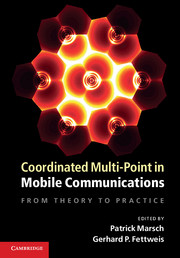Book contents
- Frontmatter
- Contents
- List of Contributors
- Acknowledgements
- List of Abbreviations
- Nomenclature and Notation
- Part I Motivation and Basics
- Part II Practical CoMP Schemes
- Part III Challenges Connected to CoMP
- 7 Clustering
- 8 Synchronization
- 9 Channel Knowledge
- 10 Efficient and Robust Algorithm Implementation
- 11 Scheduling, Signaling and Adaptive Usage of CoMP
- 12 Backhaul
- Part IV Performance Assessment
- Part V Outlook and Conclusions
- References
- Index
12 - Backhaul
from Part III - Challenges Connected to CoMP
Published online by Cambridge University Press: 05 August 2012
- Frontmatter
- Contents
- List of Contributors
- Acknowledgements
- List of Abbreviations
- Nomenclature and Notation
- Part I Motivation and Basics
- Part II Practical CoMP Schemes
- Part III Challenges Connected to CoMP
- 7 Clustering
- 8 Synchronization
- 9 Channel Knowledge
- 10 Efficient and Robust Algorithm Implementation
- 11 Scheduling, Signaling and Adaptive Usage of CoMP
- 12 Backhaul
- Part IV Performance Assessment
- Part V Outlook and Conclusions
- References
- Index
Summary
In this chapter, we address a last, but absolutely not least important challenge connected to CoMP, namely the fact that most base station cooperation schemes require information exchange over a backhaul infrastructure. Depending on the existing infrastructure of a mobile operator, both backhaul capacity and latency requirements of some CoMP schemes may be the main cost drivers or potential show stoppers on the roadmap towards CoMP. The chapter starts with addressing fundamental aspects of backhaul-constrained cooperation in Section 12.1, after which concrete backhaul capacity and latency requirements of various uplink and downlink CoMP schemes and their scaling behavior are derived in Section 12.2. Finally, Section 12.3 gives an overview on existing and upcoming backhaul technology options, and hence gives the reader a feeling of whether particular CoMP schemes can be expected to be technically and commercially feasible in the near future or not.
Fundamental Limits of Interference Mitigation with Limited Backhaul Cooperation
As we have seen in previous parts of this book, cooperation among base stations (BSs) via infrastructure backhaul networks can help mitigate interference by forming distributed multiple-input multiple-output (MIMO) systems, while the rate at which BSs cooperate is limited in wide-band cellular systems. How much interference can one bit of backhaul cooperation mitigate? In this section, we study the two-user Gaussian interference channel with limited backhaul cooperation to answer this question in a simple setting.
- Type
- Chapter
- Information
- Coordinated Multi-Point in Mobile CommunicationsFrom Theory to Practice, pp. 277 - 310Publisher: Cambridge University PressPrint publication year: 2011

